|
|
|
Sort Order |
|
|
|
Items / Page
|
|
|
|
|
|
|
| Srl | Item |
| 1 |
ID:
189241


|
|
|
|
|
| Summary/Abstract |
This article examines the global–regional politics of ecosystem governance through the case of the Amazon rainforest. Despite the bourgeoning literature on global and regional environmental politics, the interplay of these dynamics in ecosystem governance has still received limited attention. I here propose that the politics of ecosystem governance are rooted in a dispute over the realization of alternative ecosystem services. When global actors become invested in promoting ecosystem preservation to secure the realization services with diffuse benefits, it can affect cooperation at the regional level. Ecosystem-adjacent states can perceive external interest as a threat, building regional cooperation as a tool to defend sovereignty, but also as an opportunity, using it to bargain the terms of their stewardship. I use this framework to trace the evolution of regional cooperation in the Amazon, demonstrating how it was developed in response to this ecosystem's growing global salience. Through defensive sovereignty and bargained stewardship, regional cooperation helped Amazon states to cap international commitment and limit external influence in the region but also allowed for building some form of coordinated ecosystem protection. The research sheds new light on both the potential and the limitations of global–regional engagements for the preservation of the Amazon and other analogous cross-border ecosystems.
|
|
|
|
|
|
|
|
|
|
|
|
|
|
|
|
| 2 |
ID:
189232
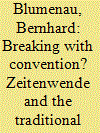

|
|
|
|
|
| Summary/Abstract |
On 27 February 2022, German Chancellor Olaf Scholz addressed the Bundestag and announced a watershed moment (Zeitenwende) for Germany's conduct of foreign affairs. Against the backdrop of the historical pillars of German foreign policy, this article reviews the core implications of the Zeitenwende doctrine. It analyses how the new policy continued or transformed traditional notions underpinning Germany's external relations: Westbindung (integration into the West) and European integration, multilateralism, the pursuit of a rules-based international order and NATO membership, hesitant leadership, Ostpolitik and Wandel durch Handel (transformation through trade), as well as a foreign policy not relying on military means. It argues that Zeitenwende represented a break with some traditional notions, such as Ostpolitik and Wandel durch Handel, and to some extent the non-military foreign policy. However, Zeitenwende also reconfirmed other traditions: Westbindung, a commitment to multilateralism and the rules-based order, as well as the reluctance to assert German leadership. With Zeitenwende, Germany remained firmly committed to the EU and NATO as the country acknowledged that it must do more for its own, and for Europe's, security. Zeitenwende represented Germany's coming to terms with, and final acceptance of, the realities of the post-Cold War European order.
|
|
|
|
|
|
|
|
|
|
|
|
|
|
|
|
| 3 |
ID:
189234


|
|
|
|
|
| Summary/Abstract |
The global power shift towards Brazil, India, China and other non-western powers has led to pressures to adjust international institutions to new economic realities. Most power shift theories assume that established powers defend their institutional privileges, while emerging powers challenge them. Conversely, in this article we reverse this assumption by shedding light on ‘privileges’ of the weak: many international institutions have established special rights for disadvantaged regime members. We ask what strategies emerging powers adopt as they come under pressure to give up these rights commonly reserved for regime members with developing country status. We present a novel conceptualization of four ideal-typical strategies that combine elements of resistance and accommodation. Empirically, we examine the strategies that Brazil, India and China (BICs) have adopted in the World Trade Organization. We find that no uniform approach exists across the BICs: while India fiercely resists giving up its status as a developing country and the flexibilities it comes with, Brazil adopts a pragmatic approach that largely accommodates established powers' demands to give up special rights reserved for developing countries. China pursues a mixed strategy of selective accommodation and resistance. These findings contribute to recent debates on global power shifts by illustrating how material incentives and status considerations shape the adaptation of international institutions as privileges for the weak are re-negotiated.
|
|
|
|
|
|
|
|
|
|
|
|
|
|
|
|
| 4 |
ID:
189240
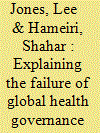

|
|
|
|
|
| Summary/Abstract |
Global health governance (GHG) was one of COVID-19's earliest victims. Soon after the novel coronavirus escaped China, the World Health Organization (WHO) was marginalized, and the International Health Regulations became practically irrelevant, as nations adopted uncoordinated, ad hoc responses. Existing explanations of GHG's collapse are largely utopian, criticizing states for failing to empower the WHO with sufficient supranational authority. This misunderstands how GHG was supposed to work in the first place and hence mistakenly diagnoses the causes of failure. We argue that COVID-19 exposed the pathologies of an entire, neoliberal approach to global governance: metagovernance and state transformation. In this approach, international organizations are hollowed out and their role shifts to metagovernance—developing and disseminating ‘best practice’ policies, institutions and rules for states to embed domestically. Such global regimes' efficacy, therefore, depends on states' capacity to enforce global disciplines. However, nation-states are also hollowed out by neoliberal strictures, undermining practical implementation. Consequently, GHG was failing long before COVID-19, leaving the system dependent on ad hoc interventions by dominant states. With the latter also affected by COVID-19, GHG was left in disarray. Reform proposals should therefore focus less on global institutions and rules and more on building domestic capabilities.
|
|
|
|
|
|
|
|
|
|
|
|
|
|
|
|
| 5 |
ID:
189243


|
|
|
|
|
| Summary/Abstract |
What is the relationship between revolution and terrorism? Much of the time, terrorism and revolution are taken to be distinct forms of political contention. This article argues that, to the contrary, their relationship is much closer than is often imagined. We show that a range of contemporary terrorist groups contain revolutionary elements: they seek to capture and hold territory, and see themselves as part of movements where the goal is to transform international as well as domestic orders. This provides two points of distinction: first, between ‘order-maintaining’ and ‘order-transforming’ goals; and second, between ‘minimalist’ and ‘maximalist’ tactics. The result is a taxonomy of different types of ‘revolutionary terrorism’. This analytic is used to dig deeper into the parameters of revolutionary terrorism, using militant Salafism as an example of a maximalist, order-transforming movement. A focus on transnational, order-transforming revolutionary terrorism generates a range of insights into the violent strategies, international dynamics and organizational forms used by Islamic State, al-Qaeda and related groups. The resulting research agenda, the article concludes, is rich in possibilities.
|
|
|
|
|
|
|
|
|
|
|
|
|
|
|
|
| 6 |
ID:
189239


|
|
|
|
|
| Summary/Abstract |
The turn of the twenty-first century witnessed a revival of interest in the role of philanthropy in the international system, especially in the fields of global poverty and health. Yet, despite an emergent critical literature in development studies and international studies, philanthropy has barely featured in the debate on global distributive justice. This article uses the republican conception of domination as an analytical framework to precisely articulate concerns of justice raised by transnational philanthropy. Using the Bill and Melinda Gates Foundation and its role in global health as a test case, it argues that transnational philanthropy is characterized by an asymmetric distribution of power, which is sufficient to produce dependence, and that is uncontrolled insofar as its use either rests on the will of powerful agents or on terms of social cooperation beyond contestation. This arbitrary character is particularly relevant to philanthropy because of its use of epistemic power to produce and legitimize knowledge. In short, transnational philanthropy is dominating. If individuals have the right to exercise control over the social institutions that profoundly affect their basic interests, then philanthropy has a problem of justice that cannot be dismissed.
|
|
|
|
|
|
|
|
|
|
|
|
|
|
|
|
| 7 |
ID:
189233


|
|
|
|
|
| Summary/Abstract |
There has been considerable debate about the capacity of emerging powers, such as the BRICS (Brazil, India, China, South Africa), to act as a unified and coherent force in global economic governance. In the case of the World Trade Organization (WTO), strategic cooperation and alliance-building among the emerging powers—specifically Brazil, India and China (BIC)—were essential to counterbalancing the US and other traditional powers and enabling the rising powers to defend their interests. However, as this article shows, the BIC alliance at the WTO has collapsed. The core issue that historically united the emerging powers and provided the foundation for their alliance was ‘special and differential treatment’ (SDT) for developing countries. Yet both Brazil and India have now defected from the alliance, abandoning China. Brazil was the first to defect, switching sides and realigning itself with the US; the change in its alliance calculations reflected shifting economic priorities and a fundamental reorientation of its foreign policy strategy away from its earlier Third Worldism. India then defected when its alliance with China, once an important source of strength in WTO negotiations, instead became a liability. As a result, having lost its key allies at the WTO, China is increasingly isolated in multilateral trade negotiations.
|
|
|
|
|
|
|
|
|
|
|
|
|
|
|
|
| 8 |
ID:
189235


|
|
|
|
|
| Summary/Abstract |
Hybrid warfare has recently attracted scholarly attention. Despite its importance, hybrid warfare research remains underdeveloped, as it sometimes falls into the trap of ‘simplistic hypothesis testing’, which focuses on narrowly defined military factors while downplaying the fundamentals of international politics (e.g. balancing and diplomacy). This article fills this gap by constructing a new theoretical concept called ‘hybrid balancing’ by introducing the essence of hybrid warfare into classical realism, based on the scientific realism in the philosophy of science as a meta-theoretical foundation. ‘Hybrid balancing’ consists of three ideal types of balancing beyond the traditional hard one: political, economic and informational balancing. As a plausibility probe to show that the argument is sufficiently grounded in evidence to justify further research, I illustrate the new concept by examining China's hybrid warfare in the Indo-Pacific, an arena of geopolitical competition between China and the United States. The implications of the research are that it (1) shows the significance of ‘agency’ over ‘structure’ to solve the agent–structure debate, (2) develops a new theoretical concept explaining non-military aspects of balancing, (3) overcomes ‘simplistic hypothesis testing’, and (4) sheds new light on the Indo-Pacific, which had been overlooked in previous research around hybrid warfare.
|
|
|
|
|
|
|
|
|
|
|
|
|
|
|
|
| 9 |
ID:
189238
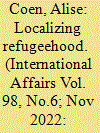

|
|
|
|
|
| Summary/Abstract |
A central challenge for the study of norms in International Relations entails understanding how meaning is enacted through use and local context. Amid trends towards governments reducing pathways of humanitarian migration, local constructions of meaning around refugeehood and the obligations owed to people fleeing persecution can influence global trajectories of containment and responsibility-sharing. As a means of advancing our understanding of norm localization and contestation, this article provides an account of how obligations around refugee protection are configured and contested among national and subnational authorities. Using a case study of discourses (re)produced among United States' federal, state and municipal leaders, it explores the multiple, complex layers of meaning which emerged around duties of care owed to foreign civilian ‘allies’ in the context of the 2021 Taliban takeover of Afghanistan. Beyond illustrating dynamics of localization and contestation, the article shows how domestic resistance to norm implementation can operate as a surrogate for wider visions of resisting liberal international principles. The case study more broadly contributes to understanding the conflicting logics associated with duties of care in the aftermath of military interventions.
|
|
|
|
|
|
|
|
|
|
|
|
|
|
|
|
| 10 |
ID:
189231
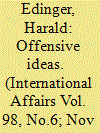

|
|
|
|
|
| Summary/Abstract |
Controversy has surrounded realist explanations of the causes of Russia's war against Ukraine, particularly John Mearsheimer's charge of western responsibility. This article seeks to clarify and contextualize his argument, situating it within the broader paradigm. Realism, and even its narrower offensive sub-school, offers a wide range of contrasting interpretations, depending on which major actors are studied and what characteristics they are endowed with. Like its classical predecessor, structural realism is premised on implicit views of human nature. In an effort to explicate some of these assumptions about the behavioural micro-foundations of states and their leaders, the article investigates main components of structural theory—including power differentials, ‘rational’ interests and states as unitary actors—and connects these concepts to base emotions like fear and anger. It argues that realists do well to differentiate between the aspirations of states and individual leaders' quest for power and status. In the same vein, reference to Russian security concerns may be emblematic of elites' perceived challenges of cultural subordination, and Putin's personal fears for the stability of his regime. Engagement with realist thought is essential, in part because of its continuing influence on policy-making (particularly in Russia) and in order to forestall improper co-option of caricaturized versions of realist arguments.
|
|
|
|
|
|
|
|
|
|
|
|
|
|
|
|
| 11 |
ID:
189237


|
|
|
|
|
| Summary/Abstract |
With the rise of populist leaders around the world, populism's impact on foreign policy and international affairs has come into focus. Adding to this literature, we propose the concept of ‘populist peacemaking’, in which key tenets of populism, in style and substance, are projected onto the sphere of international mediation. We offer an analytical framework for understanding populist peacemaking consisting of three features. Firstly, populist peacemaking is characterized by a rejection of the ‘peacemaking elites’ and their established rules and practices, including international norms, a refutation of context-specific knowledge, and a clean-slate approach that disregards past peacemaking attempts and alienates other international mediators. Secondly, populist peacemaking employs aggrandized rhetoric and symbolism that puts the mediator—rather than the conflict parties—in the spotlight, thus integrating domestic politics into peacemaking. Finally, populist peacemaking frames the process as representing the volonté générale, i.e. serving the interests of the ‘pure people’ in the conflict-affected context. We illustrate this phenomenon empirically with a case-study of United States' peacemaking efforts during the Trump era, tracing initiatives pursued by US envoys in the Israeli–Palestinian and Kosovo–Serbia conflicts. From this analysis, populist peacemaking emerges as a distinct phenomenon, not to be subsumed under the heading of ‘illiberal peacemaking’.
|
|
|
|
|
|
|
|
|
|
|
|
|
|
|
|
| 12 |
ID:
189230
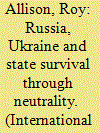

|
|
|
|
|
| Summary/Abstract |
During the Cold War neutrality and a ‘non-bloc’ status were used by certain European states to escape great power rivalries. But these foreign and security policy strategies declined in significance and have received little scholarly attention since the early 1990s. This article argues that in a period of renewed confrontation between Russia and western powers, significant insights may be derived from a critical review of the past experiences of neutral and non-bloc states. These help scholars and practitioners assess the contemporary options of states in vulnerable locations which choose or are compelled to survive outside alliances. This article probes the critical case of Ukraine as a sovereign but potentially neutral state. Relevant criteria for neutrality are drawn from short interpretive case-studies of Austria and Finland during the Cold War, as well as Moldova and Finland in post-Cold War years. Soviet and Russian policy prioritized the strategic denial of these states to NATO, while forms of armed neutrality helped sustain conventional deterrence against Russian coercion. If Moscow reigns in its ambitions for the political subjugation of Ukraine and accepts its statehood, such thinking may form part of an eventual security policy settlement beyond the current war.
|
|
|
|
|
|
|
|
|
|
|
|
|
|
|
|
| 13 |
ID:
189242
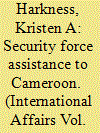

|
|
|
|
|
| Summary/Abstract |
Western countries have increasingly turned to security force assistance (SFA) to build partner capacity and counter terrorist threats in weakly governed states. This trend sits uncomfortably alongside widespread pessimism that coup-proofed and patronage ridden armies can be meaningfully reformed and made combat effective. Searching for new solutions, both scholars and practitioners have converged on the idea of creating ‘enclave units’—elite forces isolated from the broader military that can be proficiently trained and then deployed on counterterrorism missions. But can enclave units resolve the fundamental interest misalignments that have undermined SFA more broadly? This article leverages the case of the Bataillons d'Intervention Rapide in Cameroon to build theoretical insights into the promises and perils of enclave units. I find that achieving combat proficiency perversely deepens autocracy by strengthening the repressive capacity of dictators. When harshening policies and further marginalization then lead to uprisings, often among ethnic minority groups, embattled autocrats redeploy western trained enclave units against civilians. Extending these insights to the shadow cases of the Iraqi Golden Division and Somali Danab suggests that an indefinite western commitment to remain in-country and directly command enclave units may be necessary to prevent their political misuse.
|
|
|
|
|
|
|
|
|
|
|
|
|
|
|
|
| 14 |
ID:
189236


|
|
|
|
|
| Summary/Abstract |
Infrastructural power in the United States, which is the capacity to extract and deploy social resources and initiate and harness technological innovation, is increasingly generated by private internet capital and exercised by digital platforms. In this article we argue that while these private actors do not possess legitimacy, this is a form of ‘virtual sovereignty’ which complicates the capacity of the US state to exercise infrastructural power. Though internet software was designed largely by US corporations, commercial users operate increasingly in deterritorialized global spaces, where citizen consent and the interests of the US state are not business priorities. Moreover, much of the internet's hardware is financed by private internet capital within global wealth chains and digital spaces populated by US and non-US corporations. We argue that digital platforms acquire infrastructural power through the accumulation and commercialization of big data, from which they curate individual thinking and behaviour. We point to the targeting of US liberal democratic resilience by hostile, domestic and foreign actors weaponizing social media, and the potential ramifications of the exercise of virtual sovereignty for the return of great power rivalry in international relations. The article concludes that private internet capital's command of vast socio-economic resources reinforces the digital platforms' leadership in technological innovation and challenges the sovereign state's monopoly over national security.
|
|
|
|
|
|
|
|
|
|
|
|
|
|
|
|
|
|
|
|
|